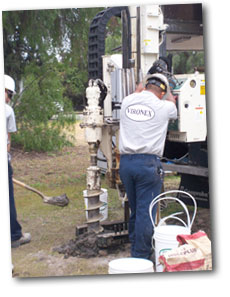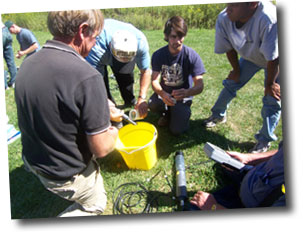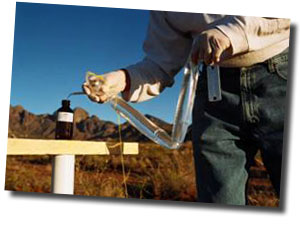
Las Cruces, NM 88011
Phone: 575-532-5535
info@envirofieldschool.com

"Learn Practical Field Methods from the Field Training Experts."
This comprehensive 4-day course covers everything from environmental drilling and
 |
| Students Learn How to Install Ground-Water Monitoring Wells Using Direct-Push Technology and Hollow-Stem Augers During Field Session #1 |
monitoring well placement, design, construction and development to correct procedures for sampling ground water from monitoring wells.
In the first 2 days of this course, instructors focus on site characterization for efficient well location, drilling methods available for installing boreholes, well design and development techniques to ensure sediment-free samples, multi-level monitoring and sampling systems, and more than 20 ASTM Standard Practices for site characterization, environmental drilling, well construction and well development.
In the final 2 days of this course, instructors focus on ground-water sampling issues, including: preparation of effective ground-water sampling and analysis plans, field QA/QC procedures, water-level measurement methods, the science behind ground-water sampling, purging and sampling methodologies (including low-flow purging and no-purge sampling), field indicator parameter analysis, selection and operation of sampling devices, sample collection and pretreatment procedures, handling and shipment of samples, and documentation of sampling events. More than 15 ASTM Standard Practices on these topics are covered in detail.
This is THE practical field course on ground-water sampling. Students learn what factors
 |
| Students Learn the Importance of Calibration of Field Parameter Measurement Instrumentation Prior to Purging Monitoring Wells |
 |
| Students Learn the Applications of No-Purge Sampling and Gain Hands-On Experience Using Passive Diffusion Bag Samplers and the HydraSleeve |
influence the successful implementation of ground-water sampling programs and how to develop effective ground-water sampling protocols or how to update existing protocols in response to changes in objectives of ground-water sampling programs. Emphasis is placed upon the importance of implementing good field practices and incorporating strong field QA/QC to ensure both precision and accuracy in ground-water sampling events.
Many topics are covered during the course, including: development of effective sampling and analysis plans; calibration and operation of instrumentation for field sampling and/or in-situ analysis of ground water; water-level and product thickness measurement; the science behind ground-water sampling; selection of purging and sampling devices and proper operation of those devices; purging and sampling options (including low-flow purging and sampling and no-purge sampling); field filtration and preservation of ground-water samples, preparation of samples for shipment (and discussions of DOT and IATA shipping regulations); and documentation of sampling events to ensure defensibility of records.
A half-day field session gives students the opportunity to work with a variety of field equipment, including water-level measurement equipment, ground-water purging and sampling devices, field indicator parameter measurement instrumentation, and filtration equipment. Students also get firsthand experience using a variety of purging and sampling methods, including low-flow purging and sampling, traditional purging and sampling, passive sampling and no-purge sampling.
Registration Fee for 2015: $1495.00 US per person (plus mandatory NM Gross Recipets Tax of 8.0%)